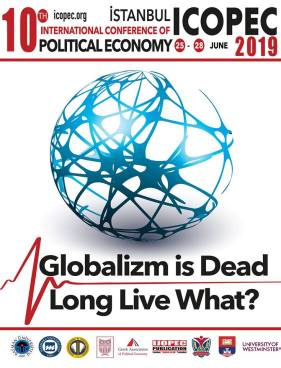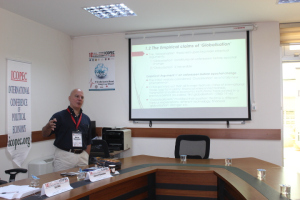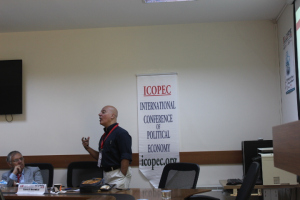ICOPEC 2019 ‘If Globalism is Dead—Long Live What?’ Marmara University Istanbul, Turkey 25-28 June 2019 ‘De-globalisation and the Return of the Theory of Imperialism’ Stavros Mavroudeas Professor (Political Economy) Dept. of Social Policy Panteion University e-mail: [email protected] web: https://stavrosmavroudeas.wordpress.com Abstract The globalisation hypothesis (i.e. the argument that modern capitalism has once and for all discard the nation state and modern capitalism became a truly unified ‘global village’) was overwhelmingly popular since the 1990s. This was coupled with the expansion of a multifaceted theoretical trend that rejected previous analytical tools and purported that it ushered new ones, tailor-made to the new ‘globalisation era’. Especially
Topics:
Stavros Mavroudeas considers the following as important: de-globalisation, ICOPEC 2019, imperialism, Mavroudeas, Ομιλίες & Διαλέξεις - Speeches & Lectures
This could be interesting, too:
Stavros Mavroudeas writes ‘Economic Crisis and the crisis of Economics: Political Economy as a realistic and credible alternative’ – S.Mavroudeas (video and supporting material)
Stavros Mavroudeas writes Financialisation versus Marxism – S.Mavroudeas (video and supporting material)
Stavros Mavroudeas writes Once again on the shadow playing of Greek capitalism
Merijn T. Knibbe writes Völkermord in Gaza. Two million deaths are in the cards.
ICOPEC 2019
‘If Globalism is Dead—Long Live What?’
Marmara University
Istanbul, Turkey
25-28 June 2019
‘De-globalisation and the Return of the Theory of Imperialism’
Stavros Mavroudeas
Professor (Political Economy)
Dept. of Social Policy
Panteion University
e-mail: [email protected]
web: https://stavrosmavroudeas.wordpress.com
Abstract
The globalisation hypothesis (i.e. the argument that modern capitalism has once and for all discard the nation state and modern capitalism became a truly unified ‘global village’) was overwhelmingly popular since the 1990s. This was coupled with the expansion of a multifaceted theoretical trend that rejected previous analytical tools and purported that it ushered new ones, tailor-made to the new ‘globalisation era’. Especially within Political Economy, the globalization discourse rejected the theory of Imperialism (that emphasized antagonisms and the role of the national economy) for a theory of global interconnectedness (emphasizing co-operation and deterritorialization). However, the course of events of the real world radically diverged from the stylized beliefs of the globalization discourse. Particularly, before and increasingly after the 2008 capitalist crisis, antagonisms along national lines and military conflicts proliferated. These developments signify the necessity of a return to the classical Marxist theory of Imperialism as the appropriate analytical framework to grasp the political economy of the international system.
Links for reading and downloading the presentation:
https://www.academia.edu/39724931/De-globalisation_and_the_Return_of_the_Theory_of_Imperialism



